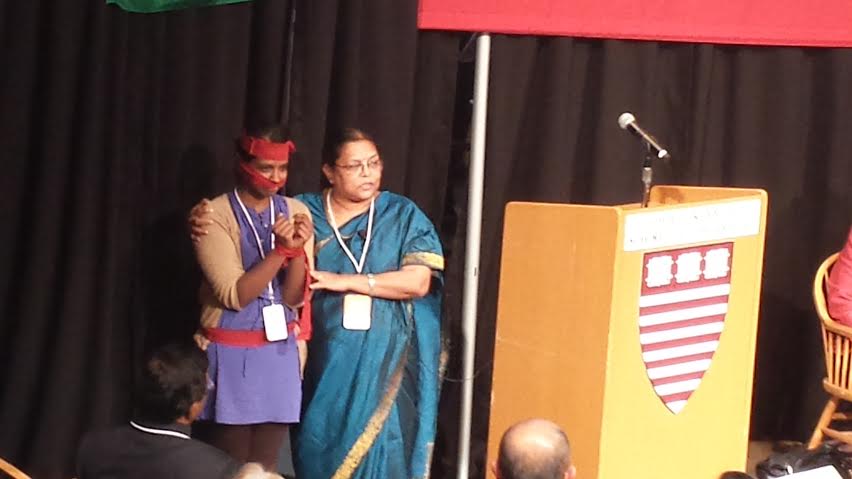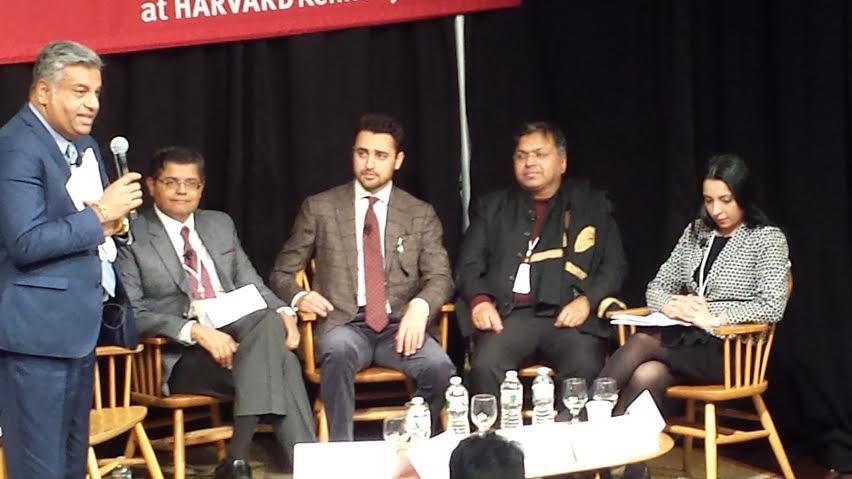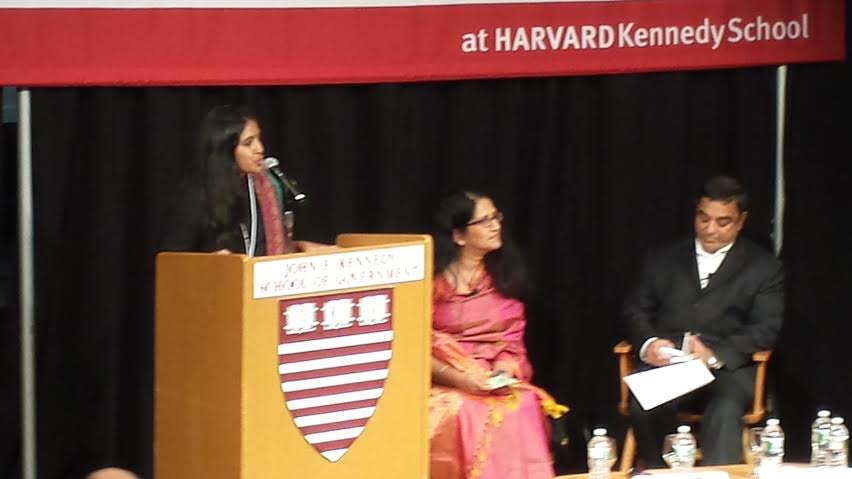Contribute
| Harvard India Conference: India In Transition |
Shrunothra Ambati
02/10/2016
On the frosty morning of February 6th, I walked into the Littauer building of Harvard Kennedy School to the buzz of conversation and hum of anticipation. Everywhere, I could hear people conversing about which panel they were looking forward to most and various discussions concerning Indian foreign affairs and business. The excitement to hear from all the distinguished and influential speakers about a country that each person cared so much about was palpable in the air. The theme, “India in Transition,†represented Indian Americans’ hopes and expectations for the future of our emerging country, and everyone highly looked forward to the insights and experiences of those who are currently at the forefront of this change.
The first keynote speaker of the conference, Former Foreign Secretary Nirupama Rao, outlined India’s place in the politics of the world, emphasizing that foreign policy is one of the key aspects of moving the country forward. She asserted that for India to be noticed as a world player, it must be less hesitant in engaging in partnerships between itself and other powers, such as the United States and China. Some challenges she described to fulfilling India’s goal regarding its global position were the size of the Indian Foreign Service and coordination between the different ministries. Nirupama Rao started the conference off with a global perspective to keep in mind while other panels and speakers addressed specific issues and solutions within India.
I personally took a keen interest in the panel on the lack of proper education for children. Called, Tackling the Learning Crisis: Equity and Quality, it discussed the hindering factors in Indian schools. The panel’s focus was not on getting children to attend schools; rather, it was on recruiting and retaining qualified teachers to improve the standard of education across the country. Many studies have cited India as one of the poorest performing countries in primary and secondary education. The panel members deliberated the need for a lower student to teacher ratio, a better recruitment process, and a decentralization of authority when it comes to schools making decisions about which teachers to hire and curriculums to follow. One panel member read out a sample of questions from an exam that teachers in India must take, and the whole room laughed at the ridiculous nature of the questions. It was clear that the test did not reflect an appropriate assessment of an instructor’s knowledge and approach to teaching. To advance India’s vision of a global leader and to fulfill its role as a great democracy, a quality education for all must be a priority.
One of the biggest social issues of 2015 and 2016 is LGTBQ rights. A few months ago, the Supreme Court ruled in the U.S. that the Constitution guarantees the right to gay marriage. However, in India, there is still much discrimination and opposition to advancing on these rights. A panel with Amit Dixit, Imran Khan, Jay Panda, Devutt Pattanaik, and Ridhika Batra talked about the obstacles India faces if LGBTQ rights are not acknowledged. A huge percentage of India’s GDP can be increased with policies that end discrimination against this group of people in the workplace. Mr. Patnaik, well versed in Hindu mythology, cited multiple stories from well-known epics and about Hindu gods that pointed to the acceptance of the LGTBQ society throughout the religion. It was an open and honest discussion that Indians can sometimes be reluctant to engage in.
There were numerous speakers and panelists over the course of the two days. Karan Johar, director and producer, presented a keynote speech on democracy. Kamal Hassan, actor, director, and writer, gave an address on the freedom of speech. Chanda Kochhar, MD and CEO of ICICI Bank spoke about India’s new growth paradigm. Shashi Tharoor, an Indian politician and writer, remarked on the “soft power,†or the power of attraction, of India. There were also panels on entrepreneurship in India and the challenges of being a woman in the Indian workplace. It was an incredible opportunity to hear from such successful and talented professionals in their respective fields.
Nayana RenuKumar, co-chair of the conference, says, “The conference acted as the platform that helped schools build and strengthen our relationships and draw inspiration and ideas from each other. Today, we know that these relationships are going to last possibly for our lifetimes, sparking the possibility of our continued collaboration for India’s development. At the end of it, we felt truly gratified that the conference brought together bright students from across the United States and engaged them with the challenges that India is grappling with.â€
It is essential to debate and discuss important issues facing India today, like the ones presented at the conference, if a change is to be made. It has a rich and diverse culture, history, and people – utilizing these assets is critical. We are all invested in the growth and success of India’s future, and we must work together and share ideas to inspire innovation and propel India to take its place as a leader in today’s modern society. The Harvard India Conference is one significant way that this goal is slowly being achieved, and it laid out a very solid foundation and desire for even more widespread and powerful talks ahead.
You may also access this article through our web-site http://www.lokvani.com/


